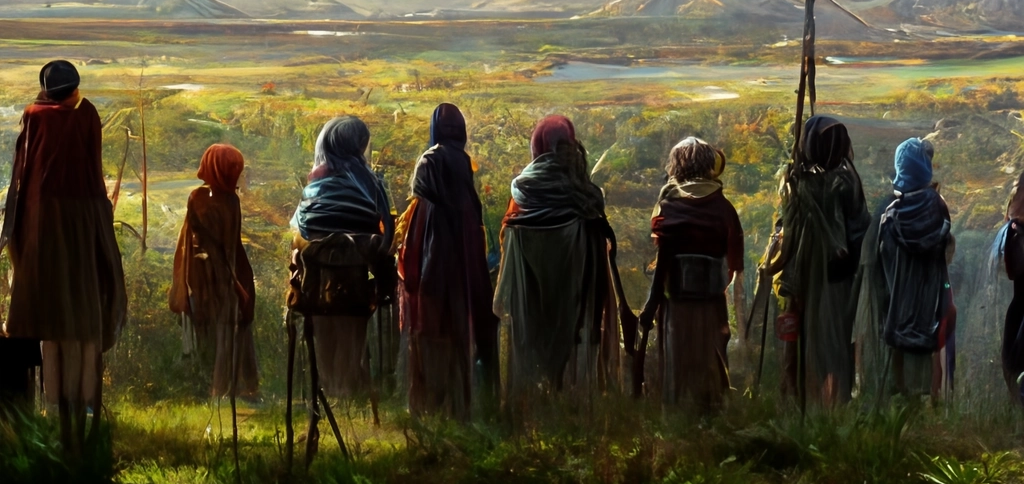Feloran People
Felorans are an Elven ethnicity originating from the region of Inner Felora on the eponymous continent. Almost 5,000 years old, they among the most ancient surviving ethnicities in the known world, with its earliest formation dating back to the integration of the Formèn, High Feloran, and Sarèn people in the aftermath of the completion of the Grand Feloran Canal in -2620 EIE.
Urbanisation of the area along the canal route created an unbroken chain of urbanised population centers and cultivated land from the mouth of the Thàro River at Til Formen'ya to the Cliffs of Erintrel to the southwest at the city of Grayàvast. The cultural influence of "pre-canal" Feloran ethnicities forms the basis of most of the Feloran cultural heritage, however the later incorporation of the eastern Ekoran peoples shaped the spiritual and mythological outlook of the Felorans. Since the dissolution of the Empire there has been a slow resurgence of regional differences, as well as the arrival of new influences from the northern continent.
Broadly, Felorans have historically been known as bureacrats and architects, and in particular have placed a strong emphasis on education and civic virtue. Feloran society values popular education and civic rule by an educated class, and as such the Feloran people have built enduring institutes of academia and bureaucracy. In recent times, discussions about just who should be running these institutions and who should have access to them have intensified between the various successor states with large Feloran populations.
Culture
Major language groups and dialects
The dominant language of the Felorans is the Feloran language, an evolution of the tongue spoken by the High Feloran people, incorporating the languages and vocabularies of the Ekoran, Formenyan, and Sarendian peoples. Only Ekora maintained a dialect distinct from that of the Empire, however the population boom and demographic shift in the Dotharan Alliance has lead to the emergence of a new dialect spoken primarily by it's half-elf dominant majority and ruling class. Off continent, Felorans have found it increasingly difficult to congregate amongst themselves and as such often adopt the local tongue out of necessity, if begrudgingly.
Shared customary codes and values
Felorans follow a philosophy that prioritises regulation and ritual over arbitrary power. Education is a core value for Felorans, and of the successor states, only Ekora lacks secular academic institutions. Most areas that were not depopulated in the collapse of the Empire have maintained local involvement in governance to some degree. The discord about who should be in what institutions has always existed, however it is growing, with some in Sarendia and the Dotharan Alliance moving towards universal education and suffrage while the Sorenians place more value on educating a professional bureaucracy.
Violent resolution of disputes, especially between Felorans, is looked down upon as reckless and self-destructive, and Felorans do not like direct confrontation. Felorans have historically been more willing to resolve disagreements with or carry out violence towards non-Elves, however this too has become more polarised, with many Ekorans, Dotharans, and Sarendians considering the actions of the Feloran Empire in it's final days to be the epitome of violating this value, while the Sorenians are increasingly willing to carry out violent acts towards even other Felorans in the name of the Sovereignty.
Average technological level
Felorans have contributed many great inventions to the known world, or at the very least attained the same technology concurrently with other advanced societies. Lanteen rigging, which enabled travel between the two continents, was an inventions of ancient Felorans, and of course it was the infrastructural knowledge of the High Felorans that enabled the digging of the canals allowing for the ethnicity to form in the first place.
Plumbing, city planning, and many philosophical concepts regarding governance and rule have originated from Felora. Most Felorans live in settlements that are some of the most advanced in the world, however the contributions of Felorans to science and technology are largely in the past, and they have begun importing foreign inventiosn. Most notably, gunpowder is beginning to make it's way into Feloran society, particularly with the cosmopolitan Sarendians and Dotharans.
Common Etiquette rules
Outside of the most traditional of institutions and settings, most Felorans are not held to a strict standard of etiquette. There are no Feloran honorifics outside of earned positions or specific organisations, and it is not unusual for a Feloran to greet another by their first name, if known, even between members of different social standing/class. Members of other races and ethnicities doing the same however can irritate aristocratic or traditional members of Feloran society. Competition is encouraged in it's nonviolent forms, such as through art or intellectual prowess.
Common Dress code
Felorans favor light, loose, and free flowing clothing, only donning heavier garments when practical or necessary. There is great regional and generational differences between specific styles and fits. Dotharans are known for incorporating styles from Galisean cultures, and well-to-do Sorenians emulate an aristocratic style echoing that of the Early Imperial Era. There is no set norm for how much clothing one is supposed to wear, with it varying by profession, region, and generation. Sorens notably favoring the most clothing, though practicality in the hotter climate still the chief priority. A Feloran trademark is distinctive and provocative headwear.
Art & Architecture
For Felorans, art exists in two primary, non-exclusive forms: reflective and recreational. No specific creative medium is favoured by Felorans as a whole, only that reflective art is more personal in scope. Feloran architectural practices and design techniques have been adopted by many Galisean cultures and polities, either through trade or through the Feloran Imperial legacy. Gargantuan monuments and the ruins of once-great cities litter the landscape of Northern Felora, and the Grand Feloran Canal is still considered a great wonder of the world.
Common Customs, traditions and rituals
Cultural traditions observed by Felorans revolve around living in harmony with the environment around them. Most Felorans believe their homes have a resident spirit, either from the material of the house or borne of the creation of the home, and an annual celebration of the day one began living in their home is akin to a birthday for Felorans. There are a few religious festivals, mostly regarding events in Ëlhyæan mythology, and secular holidays vary by region. Felorans do not have strong gender constructs of their own, however there is a spectrum of presentation that approximates common views of "femme" and "masc".
See also:
Birth & Baptismal Rites
The birth of a child is the most public family affair in Feloran society. The expecting parents announce they are with child soon after they find out, first to their peers and next to their community. The ensuing months are fraught with preparations to welcome the new life into the community, with care taken to ensure the locale is safe, and that the child will be nurtured and cared for their first 60-80 years. The length is determined by some combination of status, class, and/or region. Only the 1st birthday is celebrated publicly, with the family determining the shape and size of the gathering. Due to the communal nature of childbirth (and rearing) for Felorans, both parents are generally present for the birth.
Coming of Age Rites
Felorans do not become legal adults until sometime after their 90th birthday, and generally no later than their 130th. It is left to the individual to determine when and how they would like to declare themselves as an adult, as it is considered to be the completion of a Feloran's birth, but the process and act is referred to as the Törn'kèu ritual. By the completion of the ritual, a Feloran is expected to have chosen their adult name, their pronouns, and to declare their three pillars -their goals, their talents, and their donàlìn'ya.
Funerary and Memorial customs
Feloran funerals are solemn, but not overly sombre, affairs restricted to those designated by the deceased in their ni'tësheï (or final will). Publically, someone is remembered in fond collective memory, and those with specific sentiments often write poetry or song about them. The Ekorans of the Temple City consecrate their honoured dead and entomb them in the ni'flil pànà (or Undying Chambers), where it is believed the soul will return to hyìlthàrī (or Never-realm) from which all Elves came. This practice was also adopted by the aristocracy of the Feloran Empire and continued by the ruling class and higher statuses in Sarendia and Soren.
Common Taboos
Felorans are not an easily offended people, however respect for life and the environment is acutely felt kn Feloran comminitirs,, who have different words to refer to the intelligenceof animals versus mortals, and for whom the perceived self-awareness is paramount. There are not many social hierarchies to adhere to, with only a vague sense of grace and deference expected to authority, and even then only while in it's presence. Breaking trust between friends is the greatest taboo for a Feloran. For some, particularly those sore from the northern invasions, interaction with non-Elves is a particular personal offence. In Feloran societies at large, disregard for the surroundings of oneself is the greatest disrespect one can demonstrate in life.

Feloran Facial Collage by trekman10
Diverged ethnicities
Encompassed species
Related Organizations
Related Items
Related Myths
Languages spoken
Related Locations


